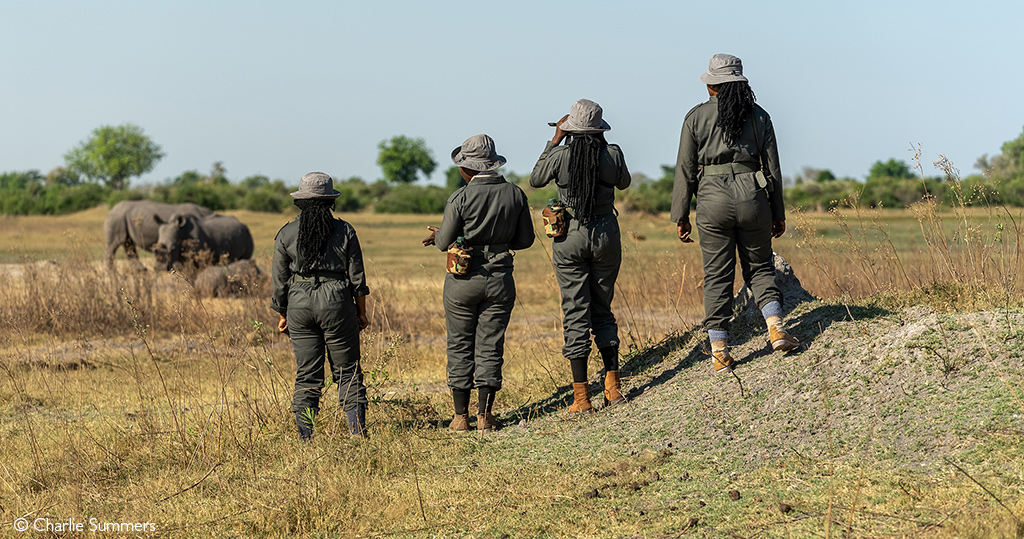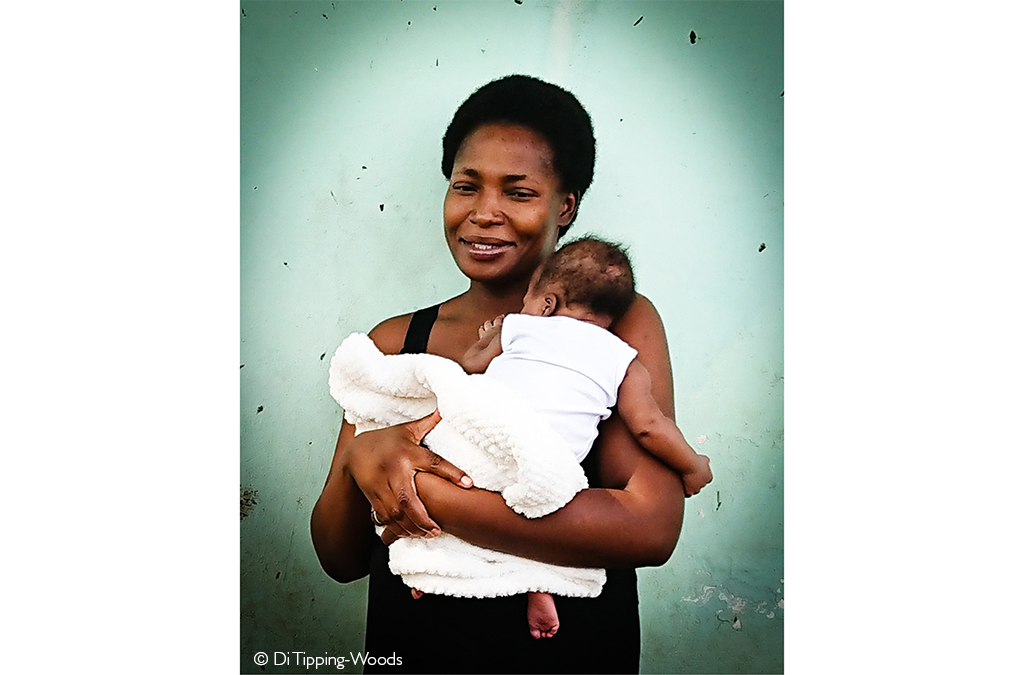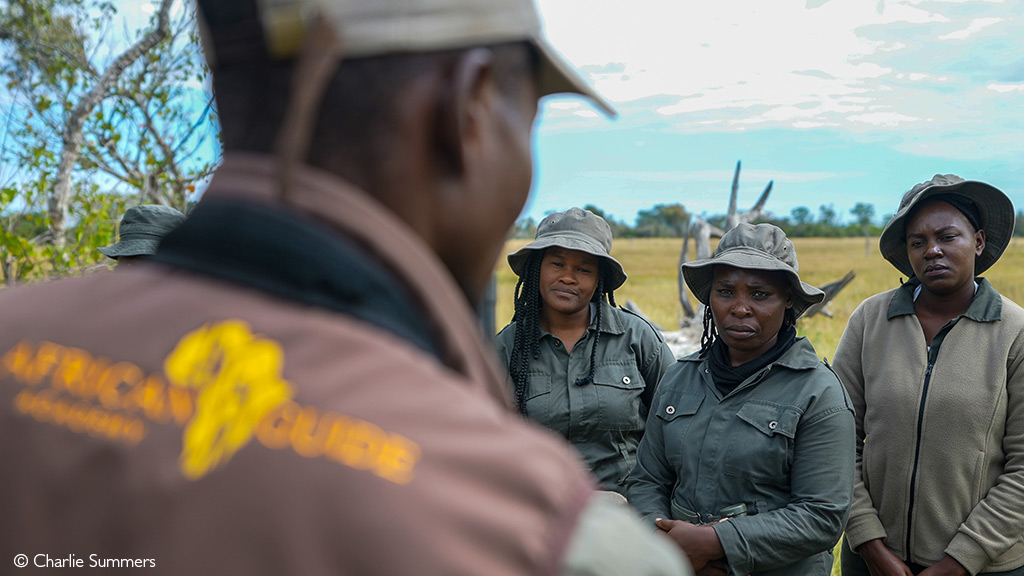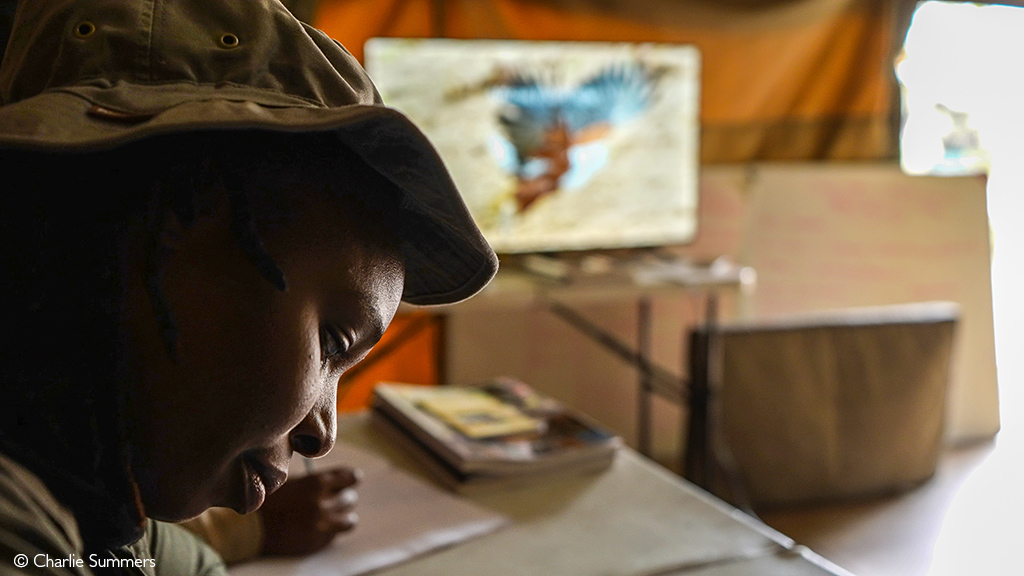
In rural conservation landscapes in many African countries, women play prominent roles in developing resilient communities. Although they are often at the very centre of the household, the heart of local communities, and the frontlines of nature stewardship, women in Africa are also particularly affected during crises, as their access to income is less secure. They also shoulder the burdens of daily life.
Surviving the pandemic
For Zambian wildlife officer turned conservation research technician Anety Milimo, COVID-19 came like a thief in the night. She knew it was out there, but not that it would take lives, jobs, and resources from her community. As a mother, she knows the demands of being a provider and caregiver. “And I’ll be frank with you, women were affected most,” says Anety.

According to the UN Women Policy Brief, COVID-19, and the Care Economy (2021), women shouldered the additional explosion of unpaid care due to discriminatory gender roles and stress on vulnerable health systems. Yet, Anety observed, women were often the first to lose their incomes from jobs deemed ‘non-essential’ when the pandemic struck.
Globally, women lost more than 64 million jobs in 2020 – a 5% loss, compared to a 3.9% loss for men. The impact of this economic crisis means that an additional 47 million women worldwide were expected to fall into extreme poverty, living on less than US$1.90 a day in 2021. According to a recent UN report, Advancing Women’s Economic Empowerment in the Tourism Sector in COVID-19 Response and Recovery, global job loss patterns were amplified in the tourism sector.


Working with local partners, WWF’s African Nature-based Tourism Platform has gathered emerging data on the effects of the pandemic on tourism enterprises in 11 African countries, including Zambia. This data is helping identify the hardest-hit communities and enterprises and their most pressing needs. Funded by the Global Environment Facility (GEF), the platform aims to mobilise at least $15 million to benefit the most vulnerable.
The data suggests that amongst those surveyed female staff dropped from 9,235 to 3,696, and men from 22,461 to 10,091. Women entrepreneurs faced losses from the direct provision of goods and services to tourists and reduced demand from tourism supply chains.
Empowering women in tourism
“The work we’re doing on gender equity and inclusion of marginalised communities is crucial to the recovery of the tourism and conservation landscape in Africa,” says WWF’s Nikhil Advani. “Women in Africa have intimate knowledge and close relationships with natural resources, and similar to the impacts of climate change, COVID-19 hit them the hardest. They are powerful land stewards and leaders but vulnerable to shocks and discrimination, which is why working with women is so important for a more resilient future for tourism and conservation.”
In Anety’s adopted hometown of Livingstone, where life revolves around the tourists and the wildlife they come to see, post-pandemic recovery is slow. Women in Africa often work in low-skilled or informal work with less access to social protection.
“During the pandemic, women in the community were desperate. Some people moved into protected areas to get wood or put down snares. Community members broke fences. And because of fewer human activities in the park, elephants started crossing into the communities. There were accidents and people getting trampled. It was a very stressful time because, you know, we are human. We can’t watch our children go hungry, but we lacked the resources to help.”
Her department deliberately engaged with women because of their needs and influence in family settings. “Having more women as front liners in tourism and conservation, especially in community and conflict situations, will benefit everyone because we are tenacious and diplomatic. But they need support because people still look down on women or give men opportunities first,” says Anety.
Women and nature: a symbiotic relationship
While women in Africa working in tourism were disproportionately affected by the COVID-19 pandemic, they are far from passive victims. Anety and others play prominent roles in developing resilient communities in conservation landscapes. There have been public and private sector initiatives for a gender-responsive recovery and to support women in conservation and tourism.
According to WWF’s Africa Region Director Alice Ruhweza, who has more than 20 years’ experience working at the nexus of conservation and development, “There is a reason we use the words ‘mother nature’ – nature personified as a life-giving and nurturing mother. Whether it’s gathering firewood, gardening, or putting food on the table – women have a stake in nature, and it is reflected in the degree to which they care about natural resources. But there are arguments that when we link women and nature, women suffer the same fate when nature is devalued and degraded. This devaluation of both women and nature can be seen in terms such as ‘virgin Earth’, ‘fertile land’, and ‘barren soil’,” says Ruhweza.
“We need to address this by recognising the important symbiotic relationship between women and nature and ensuring women have full rights to use and benefits from natural resources, and that their voices are at the table when decisions about natural resources are made. Mother nature needs her daughters.”

“The women we work with are strong and determined,” says Robyn Flemix, environmental monitoring and ranger coordinator for Great Plains Foundation, the philanthropic arm of the global tourism brand. In February 2022, she started managing a project to recruit and train 50 women rangers in Botswana and Zimbabwe. As rangers and natural resource monitors, they will help detect the early signs of illegal wildlife crime. Most of the new female ranger recruits worked in tourism and lost their jobs during the pandemic. “But they weren’t sitting at home waiting for something to happen. They were making plans to survive. It’s important to see that resilience as well,” says Robyn.
While the women all had skills, they didn’t have the specialist skills a ranger needs, so Great Plains decided to bolster their training program significantly. “We now understand that equipping them with the skills to enter the field needs to be part of this program. They have just completed a month’s Nature Guide Training course with African Guide Academy and did exceptionally well,” she notes.
One of the newly trained women rangers, Galetshwajwe Sareqo from Seronga Village in Botswana lost her job at the end of March 2020, after five years working in a safari company. “I had thought my life was set. From a salary to no salary, it was very difficult for me to purchase food and other basic necessities. I managed to build a poultry house and raised some broilers to sell. Getting this opportunity with Great Plains is a turning point for a better life for me and my family,” she says.
Playing a valued and viable role in taking care of protected areas allows women from communities bordering protected land to speak with authority and confidence and feel valued on the solutions side of conservation. “Equipping these women with the knowledge and the passion for conservation and for these wild spaces to be able to go back to the communities and share that with their children and the communities around them is essential. There is no reason that women should not be given equal opportunities to protect wildlife,” says Robyn. She believes the long-term conservation impact of this project will be powerful; because “female rangers will ultimately enable the type of community buy-in necessary to preserve Africa’s biodiversity.”
In addition, the African Nature-Based Tourism Platform has been running proposal-writing workshops designed to ensure a strong representation of women and community voices. The platform’s workshop approach has been recognised as an excellent example of gender-responsive measures in the GEF-7 portfolio. Their proactive steps included providing gender training to project staff, collecting sex-disaggregated data to ensure gender differences are visible and can be monitored, and aiming for gender parity across teams conducting interviews with communities. In addition, using the findings of the gender assessment and the gender-sensitive survey on COVID-19 impacts to prioritise funding opportunities for women, who otherwise might remain marginalised due to gender roles that leave them less connected and aware of opportunities, the platform is advancing gender parity in project decision-making processes and across project partners.
These examples show how skills development, multi-sector support and innovation can make women and nature more resilient. Still, its immediate relevance lies in bringing awareness to the role of women in conservation and tourism, where, according to a recent UN report, Advancing Women’s Economic Empowerment in the Tourism Sector in COVID-19 Response and Recovery, the majority of women (58%) work in the informal economy with little or no social protection. They have less access to finance and technology. Yet women’s participation in the tourism sector can contribute to economic empowerment and gender equality.
“Gender equity underpins all the work we’re doing through the African Nature-Based Tourism Platform. We’d love to see more partnerships between women-run enterprises, NGOs, the private sector, and the public sector that support women as they recover from the pandemic and make them resilient to future similar shocks and stressors,” says Advani.
Resources
Learn more about African Nature-Based Tourism Platform here.
As tourism slowly recovers in post-pandemic Zimbabwe, hunger still stalks the country. Many resort to the basics to survive the loss of income. Read more about communities surviving in post-pandemic Zimbabwe.
Read more about women making a difference on the frontlines of conservation.
To comment on this story: Login (or sign up) to our app here - it's a troll-free safe place 🙂.![]()






